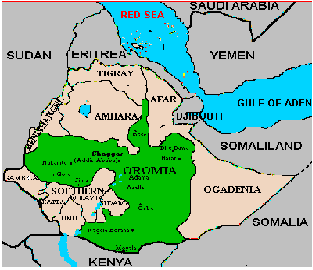A spate of arrests and terrorism charges leveled against opposition politicians and journalists in Ethiopia this year raises fears of a government slide away from democracy, analysts warn.
"The sheer numbers of arrests and prosecutions this year indicate a systematic crackdown, a systematic dismantling of the last few independent voices," said Amnesty International's Ethiopia researcher Claire Beston.
"The democratic process has been made a mockery by the events this year," she added. In November, 24 people were charged with terrorism and three journalists fled the country, citing fear of prosecution or imprisonment.
Local media also reported in November that an Ethiopian man called on his compatriots to fight for freedom, before torching himself to death.
"This is indicative of the desperation that people are starting to feel in Ethiopia," Beston added. The case follows several mass arrests: over 150 opposition members and journalists have been jailed since January, the worst crackdown since the country's bloody 2005 elections, according to rights groups.
Scores, including two Swedish journalists arrested after entering illegally into Ethiopia, are charged with terrorism. "We have reached a seminal point, which unfortunately we hit in the 2005 post-election crisis," said Tom Rhodes, from the Washington-based Committee to Protect Journalists (CPJ).
"We were always afraid of reaching those dark days again and I feel now in 2011, six years later, we've reached them," he told AFP.
Political science professor Merera Gudina said the unrest is a popular reaction to a worsening economic climate in the country, where basic costs are rising. Food prices have jumped 63 percent from last year, according to the World Bank.
"The cost of living is really dramatically increasing and many people are going hungry," the Addis Ababa University teacher said. "Hostility from the population can be expected."
But government spokesperson Bereket Simon insists the ruling party is "trying its best" to address social and economic inequality.
"The government is moving in the right direction, there might be problems here and there, but we are solving problems as we go along," he said. Ethiopia is one of Africa's fastest growing economies and has seen great improvements in the areas of child mortality and malnutrition.
But some say these improvements are not enough to stave off popular discontent. Beston said the surge in arrests is driven by a fear of an Arab Spring-style social uprising. "The government has indicated they fear those protests and a mass-scale uprising moving to Ethiopia, and they have taken measures to prevent that from happening," Beston said.
The political environment is too tight to allow for mass protest, said Ben Rawlence from Human Rights Watch (HRW). "It's not a question of whether the Ethiopians might follow the Arab Spring. They had a spring (in 2005) and it didn't bloom into summer, it went back into winter," he said.
Bereket insists most Ethiopians want to see the government develop, not topple it. "We see cooperation being the rule rather than the exception. Most Ethiopian are cooperating to fight poverty and support good governance," he said. Bereket added this year's arrests are in response to legitimate threats from both inside Ethiopia, and not as means to stifle dissent.
"These arrests are made because government had special evidence to incriminate the suspects," Bereket said. But both Amnesty and Human Rights Watch in November accused the government of using anti-terrorism legislation to stifle peaceful dissent, while Prime Minister Meles Zenawi has been accused of condemning suspects before trial.
In October, local media reported that Meles told parliament concerning those accused that "we know in our hearts that they are involved in terrorism acts." Some maintain Ethiopia's strategic importance in the region -- a relatively stable state in the volatile Horn of Africa bordering war-torn Somalia -- allows the government to clampdown with little objection from donor countries.
Ethiopia, one of the top recipients of foreign aid in Africa, also provides bases for US surveillance drones reportedly monitoring Shebab insurgents, the Al-Qaeda linked group based in southern Somalia.
"It's the same old story, (donors) believe quiet diplomacy is the best way of maintaining their access and their influence, they don't want to endanger their relationship with the government," HRW's Rawlence said.
Some fear the tight political climate could spark an angry reaction from those angry at the crackdown.
"Sooner or later, really things can go horrid," Merera said. "We can reach what you call a breaking point."

No comments:
Post a Comment
I am responsible for my posting.